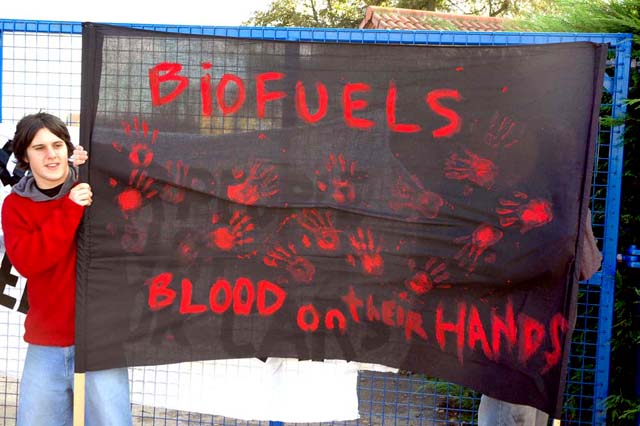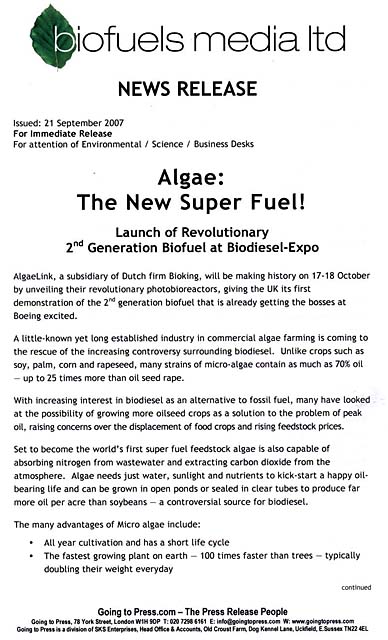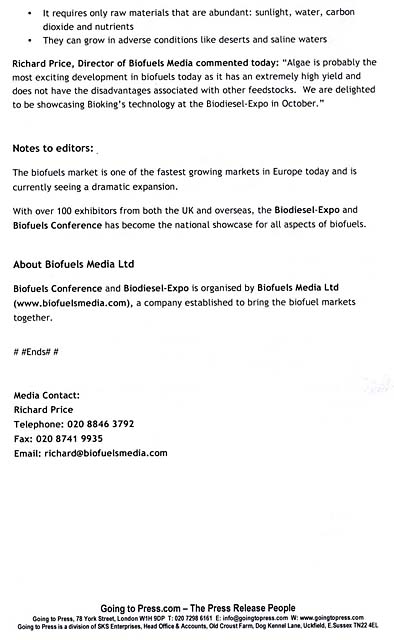Biofuels Conference Disrupted At Concerns Over Multi-National 'Greenwash'
Notts Indymedia | 20.10.2007 14:52 | Climate Chaos | Technology
This week Europe’s largest Biofuels event took place in Nottinghamshire amid growing concerns about severe impacts on climate, biodiversity and food production. The exhibition, featuring over a hundred trade stands, ran alongside a conference which opened on Wednesday with a key note speech from BP Biofuels’ Europe & Africa Director Oliver Mace, but was quickly thrown into chaos when a number of people dressed in suits marched onto the stage and pied the BP’s CEO for the ‘dangerous and dishonest’ greenwash and protest at the catastrophic effects of replacing climate-stabilising ecosystems with arable crops for biofuel feedstocks.
Throughout the afternoon, people held a very visible protest outside the conference which was held at the Newark Showground, north of Nottingham. To coincide with the national Biofuels Conference, protestors from No Agrofuels UK blockaded the D1 oils refinery and offices in Middlesbrough to raise awareness of the detrimental impact of agrofuels. 18 Protestors chained the 3 gates to the refinery shut and 2 protestors were D-locked to the main gates. No vehicles were able to enter or leave the site and all work appeared to have been stopped. Several banners were tied over the gates including "No Agrofuels, Land 4 People, Food, Biodiversity" and "Climate Change Profiteers".
Listen to audio: Biofuelwatch Talk | Activists crash biofuel party | Interview with Richard Price: Conference Organiser
On the newswire: Activists crash biofuel party 2 [afternoon] | Activists crash biofuel party 1 [morning] | Photos from Bio-Diesel Expo banner demo | Banner Protest outside Biodiesel Expo in Newark | Blockade of D1 Oils - anti-agrofuel demo | BP Executive pied as Europe's largest Biofuels Event disrupted | Biofuelwatch talk at the Sumac Centre, Nottingham

This morning a group of 15 climate change activists from protest group Food Not Fuel entered the Bio Fuel Expo & Conference taking place at the Newark Showground and took over the keynote speech. Oliver Mace, CEO of BP Fuels, the lead sponsors of the event received a cream pie in the face. Another campaigner was D-locked to the podium and various alarms were placed around the place. The hall was emptied and talks were cancelled. There were no arrests.
They were protesting against planned expansion of biofuels citing its contribution to deforestation and the fact that it will continue to contribute to climate change. The activists complained that biofuels on a large scale is greenwash and companies such as BP are ignoring its negative impacts on the environment.
Protester Michelle Lynch said, "What they are promoting is a replacement to fossil fuels, but the reality is that they are little better. Large scale plantations are not the solution; reducing our consumption is the only realistic way forward."
Another protester, Thomas Bradshaw pointed out, "Biofuels will be taking food from the mouths of the hungary when there are already 800 million people suffering from malnutrition. These corporations are effectively encouraging the erosion of valuable arable farmland and rainforests vital for combating climate change."
Notes:
1. The protestors argue that radical social change is needed to deal with the impact of peak oil and climate change, and that seeking solutions such as carbon trading and biofuels are not the answer, as the real problem is unsustainable economic growth.
2. The Bio Fuels Expo & Conference (www.biodiesel-expo.co.uk) is the largest of its kind in Europe, and brings together big industry players such as BP Fuels, Deloitte & Touche and many chemical, agricultural and manufacturing companies.
3. A comprehensive critique of biofuels can be found at Bio Fuels Watch (www.biofuelwatch.org.uk) who are a distinct group from Food Not Fuels, but are hosting their own demonstration against the Conference.
Biofuels & Fossil Fuels: Biofuels that are not produced by recycling waste oil are the direct product of large scale monoculture. Currently the amount of fossil fuels required to produce biofuels is greater than the amount of fuel you get out: you have to make the fertilizer, run the agricultural machinery, transport the feedstocks and fuels, and refine the plant matter into fuel.
Biofuels & Food: The land that is used to farm biofuels has to come from somewhere. If it is agricultural land used for food then there will be less food. Maize, Mexico's staple crop, have increased massively due to American demand for bioethanol. Adding to the number of people living below the poverty line.
Biofuels & Land use: If not agricultural land, then biofuels will be grown on virgin rainforest or wetland. 1/3 of all greenhouse gas emissions come from the destruction of living carbon sinks. The Amazon rainforest is the largest driver of the climate on the planet and expanding bioethanol plantations will push it to extinction. Wetlands, eg peat, contain more carbon that the whole atmosphere and cover just 1% of the worlds surface. The largest peat bogs in the world, in Indonesia, are currently being drained for palm oil plantations. If greenhouse gas emissions continue as they currently are we will go beyond the climate tipping point causing mass extinction of life on earth.
Biofuels & Local Control: The driving force beyond the expansion in biofuels are big corporations such as BP & Monsanto, and government - the very people who have got us into this mess. They are using biofuels as a way to continue their position of power into the post peak oil world. To stand a chance of survival the control of land must be by local people for local people.
The Solution: We will need to reduce our consumption to levels that we can meet ourselves. This WILL mean a reduction in luxuries, like the luxury to travel. Some biofuels will be used, but at a fraction of our current oil use. We need to end the search for technological solutions to economic problems. We need to localise our economy, produce our own food, make our own tools and use less. We need an end to economic growth.
Notts Indymedia
Additions
Photobioreactors : part of the problem or solution?
21.10.2007 21:42



Please help, I'd like to know.
Having attended the Biofuelwatch talk at the Sumac Centre, Nottingham, I was reminded of many of the issues surrounding biofuels. I knew much of this before, but found the talk really useful and informative in reminding me of the 'greenwash' surrounding this field.
I think perhaps the main problems are that by multi-national companies are using these technologies, to extend their 'green' credentials and hoodwink the public into thinking that their activities are socially responsible after all. This is why the activist 'cream pied' the main BP speaker.
The idea of using less fossil fuel and extending fuel efficiency is not just a future ambition, but is a required activity. Rather than just adjust our lifestyle, abandon the idea of economic growth and simply use less resources, we are told that we may be able to grow ourselves out of the futures fuel shortages. The fuel Vs food tension for land use then has serious implications for us and most of the developing world. It is apparent that global agriculture as it currently constituted, does not the ability to feed us all. So, now there is pressure to tear down rain forests to make more space. Famine, follows not only wars, economic greed but also now increasingly environmental damage. If we cannot grow sufficient food for us humans, what proportion of the fertile lands should we give up to grow biodiesel and the like?
I went to the conference / exhibition, know all this and it informed most of my objection ....... but while there, I came across an exhibitor AlgaeLink. This is a Dutch company and they demonstrated their Photobioreactors! They take on, all of the above objections and they say, have some significant advantages. Among which are that
1. Algae grows 100 times faster than trees, typically doubling their weight every day.
2. They can grow in adverse conditions like desert and saline waters. [So is not in competition with food land use]
3. Requires only sunlight water some nutrients and carbon dioxide.
4. Absorbs carbon dioxide from atmosphere, hence assisting with diminishing a greenhouse gas.
5. Absorbs nitrogen from wastewaters.
6. Systems are easily installed and are fairly low tech, requiring little maintenance. Perhaps might be described as 'appropriate technology', in that they might not just be successfully maintained by 'developed economies', but generally in the world. Transporting such resources would be diminished, when locally grown.
Now, I'm not a salesman for the company :-) but I have to say that I have been wobbled in my opposition to 'biofuels' when all put into one basket. This method is described as a 'second generation' biofuel. This method does seem to address a lot of my concerns. While accepting that the so called advanced and developing countries so obviously need to consume less resources anyway, I do think that this technology, when developed, might me added to the solution side of the equation, rather than the problem column.
I add this lot here to express what I've found out, and ask others to critisise, if I'm wrong in these conclusions.
Tash
 e-mail:
tash@indymedia.org
e-mail:
tash@indymedia.org
Comments
Hide the following 6 comments
Biofuels and food shortages
27.10.2007 22:02
In addition to the environmental impact of biofuel production Jean Ziegler, a United Nations human rights expert, has recently highlighted the damaging effect the use of food crops for fuel production has on world food prices. Effectively pushing up the price of food, the expansion of the biofuel industry is "absolutely catastrophic" for impoverished populations around the world who already struggle to afford food.
Rob Eagle
 e-mail:
rae28@cam.ac.uk
e-mail:
rae28@cam.ac.uk
Dino Diesel PR spin?
31.10.2007 17:47
In this complicated world often funded by petro-dollars it is often difficult to know who to believe or trust.
Greasy Pole
Is there a constructive way forward?
01.11.2007 00:59
Firstly, there is the question of whether biofuels can make a useful contribution to the control of greenhouse gases and hence global warming. It seems clear to me that they can and must. Of course, the major contribution has to come from conservation and use-reduction. But there will always be an irreducable minimum of energy use if we are to continue to use machines, cook, or keep ourselves warm. It would surely be better if that minimum was provided by sustainable production than fossil fuels, wouldn't it?
The second question is, if biofuels are to be developed, how should it be done? Destroying the rainforests, seizing peoples' land and using food to fuel rich peoples' SUVs while others starve is wrong, whichever way you look at it. Interestingly, had the protesters stayed in the hall, they would have heard Olivier Mace from BP say exactly that. (I was in the audience.) He very clearly made the point that biofuels need Government support to survive, that that support will only be forthcoming if there is public support, and that will vanish unless the biofuel industry is clearly seen to be acting in the best interests of the environment, the third world and indigenous farmers.
The same point was made over and over again through the two days of the conference. In fact, when the two protest groups were invited to make a presentation on day two (which they did, very eloquently) the only surprise was that they were echoing what had gone before.
So, my modest suggestion is this: There is a crucial role for environmental NGOs to play in keeping the big companies honest. Monitor their activities, attend the sustainability meetings such as the Roundtable on Sustainable Palm Oil, and shout from the rooftops if you find them straying from the straight and narrow. But more importantly, recognise that some companies are trying to do this right and work with them to squeeze out the sharks who are doing all the bad things you mentioned. Working together, there is the possibility that we could create a biofuels industry which does a host of good things in the world: protects the environment, halts or reverses desertification, provides income to the poorest farmers and rural employment in 3rd world countries, and stabilises world food prices.
It would be a shame to throw the baby out with the bathwater.
Peter Lapinskas
 e-mail:
indymedia.to.lapz@xoxy.net
e-mail:
indymedia.to.lapz@xoxy.net
Biofuelling Poverty - EU plans could be disastrous for poor people, warns Oxfam
01.11.2007 10:57
Biofuelling Poverty - EU plans could be disastrous for poor people, warns Oxfam
EU plans to increase the use of biofuels could spell disaster for some of the world's poorest people warns international agency, Oxfam in a new briefing published today.
Oxfam briefing note: Biofuelling poverty
EU proposals will make it mandatory by 2020 for ten per cent of all member states' transport fuels to come from biofuels. In order to meet the substantial increase in demand, the EU will have to import biofuels made from crops like sugar cane and palm oil from developing countries. But the rush by big companies and governments in countries such as Indonesia, Colombia, Brazil, Tanzania and Malaysia to win a slice of the 'EU biofuel pie' threatens to force poor people from their land, destroy their livelihoods, lead to the exploitation of workers and hurt the availability and affordability of food.
"In the scramble to supply the EU and the rest of the world with biofuels, poor people are getting trampled. The EU proposals as they stand will exacerbate the problem. It is unacceptable that poor people in developing countries should bear the cost of questionable attempts to cut emissions in Europe," said Robert Bailey from Oxfam.
Biofuels may offer the potential to reduce poverty by increasing jobs and markets for small farmers, and by providing cheap renewable energy for local use, but the huge plantations emerging to supply the EU pose more threats than opportunities for poor people. The problem will only get worse as the scramble to supply intensifies unless the EU introduces safeguards to protect land rights, livelihoods, workers rights and food security.
EU member states agreed that the ten per cent target must be reached sustainably, but Oxfam warns that the current proposals contain no standards on the social or human impact.
"The EU set its biofuel target without checking the impact on people and the environment. The EU must include safeguards to ensure that the rights and livelihoods of people in producing countries are protected. Without these, the ten per cent target should be scrapped and the EU should go back to the drawing board," said Bailey.
"Let's be clear, biofuels are not a panacea - even if the EU is able to reach the ten per cent target sustainably, and Oxfam doubts that it can, it will only shave a few per cent of emissions off a continually growing total."
Published reports show that as much as 5.6 million square kilometres of land - an area more than ten times the size of France - could be in production of biofuels within 20 years in India, Brazil, Southern Africa and Indonesia alone. The UN estimates that 60 million people worldwide face clearance from their land to make way for biofuel plantations. Many end up in slums in search of work, others on the very plantations that have displaced them with poor pay, squalid conditions and no worker rights.
Women workers are routinely discriminated against and often paid less than men.
In Indonesia almost a third of palm oil is produced by smallholders most of whom lost their land to advancing plantations and were 'rewarded' with a two hectare plot. These smallholders are bonded to the palm oil companies which provide them with credit and are required to sell to them - which means they do not get the best price for their oil.
Abet Nego Tarigan, deputy director of Sawit Watch which represents communities, farmers and plantation workers affected by palm oil development in Indonesia, said:
"Decisions on biofuels made in Europe are directly affecting millions of people in Indonesia. In the relentless pursuit of biofuel gold, big powerful palm oil companies are callously clearing communities from land they have farmed for generations, workers and small holders are shamefully exploited and we are losing valuable agricultural land to grow the food we need to feed ourselves and make a living. The proposed EU policy will only make this worse - pushing more people into poverty and concentrating land in the hands of a few.
Ends
Press enquiries to Ashish Sharma, 07808 729 195 or 01865 472498.
Note to editors:
Oxfam Briefing Note - Biofuelling Poverty: Why the EU renewable fuel target may be disastrous for poor people. Available to download
*****
Biofuel rush harmful, Oxfam warns
"Green fuels" could be bad for the planet, say environmental and development groups
tash
 e-mail:
tash@indymedia.org
e-mail:
tash@indymedia.org
Climate rally to demand that Gordon Brown stops bungling with biofuels
06.12.2007 22:08
For immediate release, December 7th 2007
www.biofuelwatch.org.uk
Climate rally to demand that Gordon Brown stops bungling with biofuels
Campaigners on Saturday’s climate rally and march in central London are demanding that UK Prime Minister, Gordon Brown reverses his Government’s decision to force biofuels on motorists from next April. The march will stop at Downing Street to hand in a letter to Mr Brown that demands his government takes urgent action on climate change, including halting biofuel production.
The letter highlights that deforestation, forest and peat fires, and peat drainage and destruction are major contributors to global warming and the main reasons why Indonesia now ranks third amongst the world’s worst greenhouse gas emitters. A recent scientific report showed that biodiesel from Indonesian Palm Oil could emit up to 36 times the CO2 than fossil diesel.
Biofuels grown in Europe also have high climate impacts. Oilseed rape biodiesel that is 80% of the European market may produce up to 70% more emissions than fossil diesel.
Dr Andrew Boswell, from Biofuelwatch, an NGO that specialises in highlighting the dangers of massive biofuel expansion said ‘UK policy under Gordon Brown is literally bungling with our futures. He is pushing for massive use of biofuels - that in turn can make climate change worse, and have disasterous consequences for the poor and disadvantaged. The UK government must drop its biofuels targets and demand that the EU freeze their targets too, so that there can be a full public policy debate on biofuels. ‘
Summary of biofuel demands in letter to Gordon Brown
· The UK government should abandon its target for 2.5% biofuels at the pump from April rising to 5% by 2100.
· The UK government should demand the EU freeze their targets under the EU Biofuels Directive and establish a moratorium under which there can be a full, evidence based, public policy debate on biofuels.
· The EU should ban importing biofuel raw materials from outside Europe
· The EU should ban production of biofuels from large scale monocultures within the EU until it can conclusively prove that these do not result in higher greenhouse gas emissions than conventional fossil-derived fuels especially through high nitrous oxide emissions from nitrate fertilisers.
Notes for editors: Background materials
1. ‘The bog barons: Indonesia's carbon catastrophe’, New Scientist, December 1st,
2. Paul Crutzen study on nitrous oxide emissions from fertilizer used in biofuels,
Contacts:
Dr Andrew Boswell, Director, biofuelwatch
E:
Notes for editors: Extract from letter to Gordon Brown
We demand that the UK government immediately reverse its decision to mandate 2.5% of biofuels at the pump from April 2008 under the Renewable Transport Fuel Obligation. The RTFO will increase the demand for products like Palm Oil from Indonesia, the rapid increase in the cultivation of which has been a major factor in the accelerating deforestation of the region. Deforestation, forest and peat fires, and peat drainage and destruction are major contributors to global warming and the main reasons why Indonesia now ranks third amongst the world’s worst greenhouse gas emitters, despite having relatively little industry. The RTFO will have the effect of speeding up rather than slowing down global warming. Worse than that, the deforestation that it will accelerate risks bringing about a complete collapse of tropical rain forest ecosystems which could involve a massive and very sudden release of CO2 – a ‘tipping point’ or ‘positive feedback’ that might trigger a catastrophic warming episode. This is not to mention the humanitarian crisis that could result from the effect that the production of agrofuels is likely to have in pushing food commodity prices to record levels and thereby causing more hunger, amongst the world’s poor.
We also demand that the UK government should demand the EU freeze their targets under the EU Biofuels Directive and establish a moratorium under which there can be a full, evidence based, public policy debate on biofuels. Not only should there be a moratorium on the production of biofuels from imported raw materials, within the EU (for the reasons given above) but also a moratorium on the production of biofuels from large scale monocultures within the EU – at least until it can be conclusively proved that these do not result in higher greenhouse gas emissions than conventional fossil-derived fuels especially through high nitrous oxide emissions from nitrate fertilisers.
George Monbiot,
Honorary President, Campaign against Climate Change
Phil Thornhill
National Coordinator, Campaign against Climate Change
Jonathan Neil
Secretary, Campaign against Climate Change
Peter Robinson,
Chair, Campaign against Climate Change
Jonathan Essex,
Steering committee member, Campaign against Climate Change
Andrew Boswell,
Director, Biofuelwatch and Norwich Campaign against Climate Change
BioFuelWatch
 e-mail:
andrewboswell@fastmail.co.uk
e-mail:
andrewboswell@fastmail.co.uk
 Homepage:
http://www.biofuelwatch.org.uk
Homepage:
http://www.biofuelwatch.org.uk
Algae nonsense
14.05.2008 21:50
Here's why:
Peter Chambers